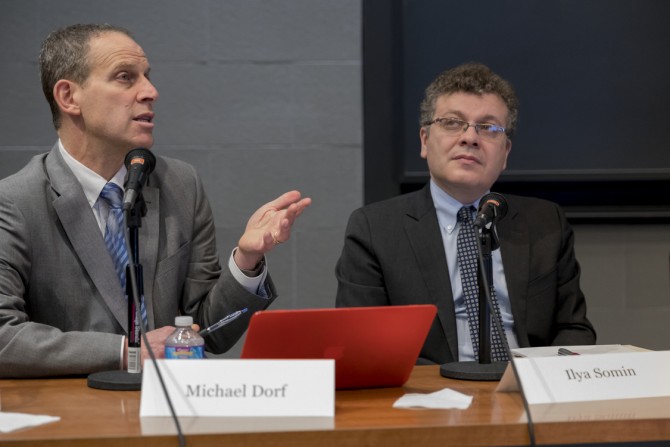Law scholars dissect Trump’s immigration actions
By Susan Kelley
Last spring, when Cornell Law School scheduled a panel discussion on immigration and executive power for September, administrators weren’t sure if the topic would still be timely.
“I guess it is safe to say that our concerns in that regard proved unjustified,” quipped Eduardo Peñalver, the Allan R. Tessler Dean of Cornell Law School, at the Sept. 8 discussion in Myron Taylor Hall.
Three eminent constitutional scholars discussed President Donald Trump’s recent rescission of the Deferred Action for Childhood Arrivals (DACA) program and his travel ban on nationals of six mostly-Muslim countries.
More than 250 people attended, and many more watched via livestream. A video of the discussion is available online.
In his opening remarks, Peñalver noted Cornell and the Law School have issued several statements opposing these actions.
“Cornell has a point of view about immigration policy because Cornell is an academic institution dedicated to global engagement and committed to fostering an environment in which people from all backgrounds rightly consider themselves full and equal members of our community,” he said. “… In situations like these, it is appropriate and important for Cornell to speak out in support of its founding principles, even at the risk of appearing partisan.”
Since the New Deal, the power of the executive branch to adopt policy, including immigration policy, has greatly expanded, the panelists said. Unfortunately, President Barack Obama publicized DACA as an alternative to legislation, not as a conventional executive power, said Michael Dorf, the Robert S. Stevens Professor of Law: “I took a skeptically supportive view … because I was worried about what would happen in the next administration.”
Presidents since Eisenhower have allowed immigrants to stay in the country. For many reasons, including economic ones, that is “the sensible thing to do,” said Eric Posner of the University of Chicago. “DACA just formalized and publicized it.”
Trump has made several “ridiculous and indefensible claims of executive power,” such as his efforts to target sanctuary cities, said Ilya Somin of George Mason University. The expansion of executive power has been going on for decades and should be curtailed, he said: “It would be a mistake to think that this is a problem we can get rid of simply by focusing on one man, even when that man is as egregious as Trump.”
The U.S. Supreme Court will hear oral arguments in the travel ban case on Oct. 10. It may decide the case is moot and should be thrown out, because Trump’s ban was for 90 days, which will be over by the time oral arguments start.
The 90-day period was ostensibly for the government to review how it vets people from the banned countries, Dorf said. “Anybody with a calendar will realize it’s been much more than 90 days since the original ban took place,” Dorf said. “… But there’s no indication that they’re actually conducting a review.”
If Obama had instituted the ban, the courts would have accepted it, Posner said. “What’s obviously going on here is the courts don’t trust Trump,” he said. The courts have long assumed they were not in a position to second-guess the president on foreign relations, immigration and national security, Posner explained. “That assumption was always based on the view that the president was at least acting in good faith. I think they’re no longer sure of that.”
Some say the statements Trump made as a candidate regarding Muslims cannot be interpreted as his motivation for the travel ban, moderator Stephen Yale-Loehr, professor of immigration law practice at Cornell, noted.
Somin countered that presidents keep 75 to 80 percent of their campaign promises. “To say that campaign statements are no real indication of the president’s motives is just to close your eyes to obvious political realities,” he said.
The Supreme Court could try to avoid ruling on the merits of the travel ban case by declaring it moot, Dorf and Yale-Loehr said. Or it might implement a narrower ban, Yale-Loehr added.
Attorneys general in 15 states and the District of Columbia have filed a lawsuit challenging the DACA rescission, on grounds including that termination of DACA intentionally discriminates against Mexicans. The lawsuit faces an uphill battle, the panelists said.
However, Congress could enact legislation within six months to offer relief, Yale-Loehr said.
And one legal aid organization estimated 30 percent of DACA recipients actually can get a green card under current legislation, he said. “So, all DACA recipients should consult a qualified immigration lawyer to see if they can … legalize their status.”
Media Contact
Get Cornell news delivered right to your inbox.
Subscribe